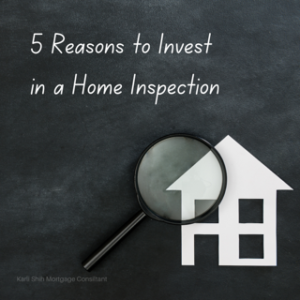
While home inspections might not be the most exciting part of your home buying journey, they are extremely important and can save you money and a major headache in the long run.In a competitive housing market, there can sometimes be pressure to make an offer right away without conditions. However, no matter how competitive a market may be, you should never skip out on things designed for buyer protection – such as a home inspection.
You may have a good eye for décor and love the layout of your potential new home, but what is under the surface is typically where headaches can lie. We have all heard the expression “don’t judge a book by its cover” so why would you make the most important purchase in your life without taking a very close look at it?
In fact, there are five reasons that a home inspection might just be the best $300-$500 you ever spend.
It Provides An “Out”
When buying a new property, it is always best to avoid taking chances. While a house may look great on the surface, hidden structural issues such as a cracked foundation or roof damage can easily turn into expensive repairs. A home inspection can help reveal any large and/or hidden issues, which can often provide an ‘out’ for you from your contract.
If you find something that will cost a considerable amount to replace or repair, you can go back to the seller’s agent and ask for a reduction in the price. A leaky roof may cost a few thousand to replace. Perhaps the seller would split the cost with you? It’s worth asking. If the price cannot be re-negotiated as issues come to light, then it may be best to walk away on the basis the home will cost you too much in the long run.
Confirms Safety And Structural Integrity
Another benefit of having a home inspection is not only to find issues, but also to confirm structural integrity. During an inspection, the inspector will review everything from the attic to the farthest reaches of the basement looking for things like mold, holes in the chimney, saggy beams or improper wiring.
Reveal Illegal Additions Or Installations
Similarly to determining any safety and structural issues, home inspections can also reveal hidden additions or DIY installations that may cause trouble down the road. If the seller wired the house improperly or used substandard materials, it not only could cost in the future but it could even invalidate your home insurance should something happen!
Forecast Future Costs
A home is an ongoing expense, much like a car. Unless it is brand new, regular maintenance and updates will be required to replace things when they become old and inefficient. For instance, water heaters typically last for 6-10 years, the life of a good roof is around 20 years, and furnaces can last up to 25 years. The home inspection report will include an estimate on the remaining life for each of these items, giving you an idea of future expected costs and providing you time to save for their eventual replacement.
Peace of Mind
Finally, and perhaps most importantly, getting a home inspection is important for your own peace of mind. A home is a huge investment, and one that you will be paying off for 20 or 30 years. It is much easier to feel good about your investment after you have gone through a home inspection and you know the house is safe and that you won’t run into any surprise problems down the road. While a home inspection isn’t free, peace of mind is priceless and a few hundred dollars is certainly worth the expense.
Original post courtesy of the DLC Marketing Team.

